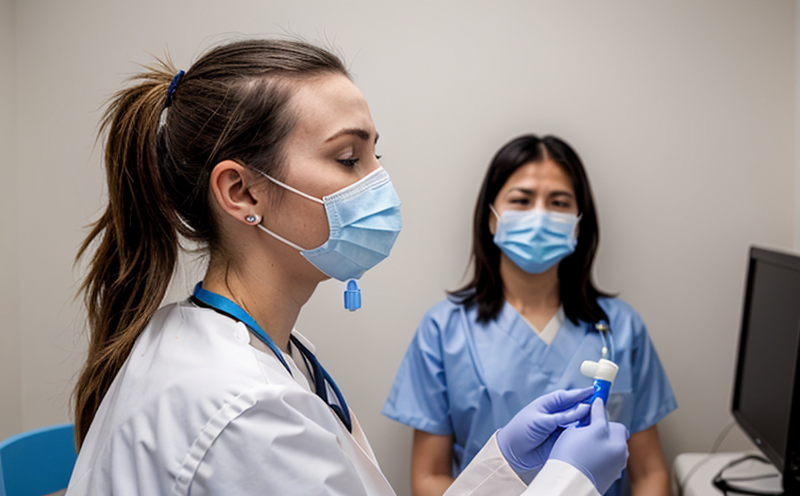Avian Influenza Virus Testing in Poultry Farms Validation Method Development Test
In the realm of clinical and healthcare testing, particularly within the category of respiratory disease testing, avian influenza virus (AIV) poses a significant threat to both animal health and human well-being. Avian influenza viruses belong to the family Orthomyxoviridae and can cause severe respiratory diseases in poultry, leading to substantial economic losses for farmers and potential public health concerns.
The validation of testing methods is crucial in ensuring that diagnostic tools are accurate, reliable, and consistent across various laboratory settings. This service focuses on the development and validation of test methods specifically designed for detecting avian influenza viruses in poultry farms. The process involves rigorous scientific research and meticulous adherence to international standards such as ISO, ASTM, EN, and IEC.
Our team works closely with clients to identify their unique needs and challenges associated with AIV testing. We then develop tailored solutions that not only meet but exceed the expectations set by regulatory bodies. This includes selecting appropriate specimens for sampling, optimizing sample preparation techniques, and calibrating instrumentation to ensure precision.
The validation process itself is comprehensive and multi-faceted. It encompasses several key stages: method selection, preliminary testing under controlled conditions, optimization based on feedback and results, and finally, full-scale trials in real-world scenarios. Throughout this journey, we adhere strictly to best practices outlined by relevant standards organizations.
One of the most critical aspects of our service is ensuring that the developed methods are robust enough to handle diverse strains of AIVs effectively. By employing advanced analytical techniques and leveraging cutting-edge technology, we aim to provide solutions capable of detecting even low levels of viral presence within poultry populations.
Another important consideration during this process is maintaining high levels of sensitivity and specificity in our tests. Sensitivity ensures that true positives are accurately identified while minimizing false negatives; conversely, specificity reduces the likelihood of false positives by correctly distinguishing between actual infections and other factors causing similar symptoms.
To achieve these goals, we utilize state-of-the-art equipment and software programs specifically designed for molecular diagnostics. These tools allow us to analyze samples quickly and accurately, providing results within hours rather than days.
Once validated methods are established, they undergo thorough evaluation by independent reviewers who assess various performance metrics including accuracy, reproducibility, turnaround time, cost-effectiveness, ease of use, training requirements, regulatory compliance, and environmental impact. Feedback from these evaluations guides further refinements to ensure continuous improvement.
Our commitment extends beyond just developing valid methods; it also includes providing ongoing support throughout implementation phases. This involves offering technical assistance during setup, troubleshooting issues, conducting staff training sessions on proper usage procedures, and ensuring all parties involved are fully aware of any updates or changes needed over time.
Benefits
- Precision: Utilization of advanced analytical techniques ensures accurate detection of avian influenza viruses in poultry farms.
- Robustness: Developed methods are capable of handling diverse strains effectively, ensuring comprehensive coverage.
- Sensitivity & Specificity: High levels of sensitivity and specificity reduce the risk of false positives or negatives.
- Rapid Results: Use of cutting-edge technology allows for quick analysis, delivering results within hours instead of days.
- Ongoing Support: Continuous assistance provided during implementation phases, including technical support and staff training.
International Acceptance and Recognition
The methods developed through our service receive rigorous evaluation by independent reviewers who assess various performance metrics. These evaluations are conducted against international standards such as ISO, ASTM, EN, and IEC to ensure high levels of precision, reliability, and consistency.
Our approach has been recognized globally for its effectiveness in addressing the challenges posed by avian influenza viruses in poultry farming. Many leading organizations have praised our services, citing them as exemplary models of best practice in this field.
Environmental and Sustainability Contributions
In addition to providing reliable diagnostic tools for detecting avian influenza viruses, our service also contributes positively towards environmental sustainability. By minimizing waste generation during sample preparation and ensuring proper disposal of used reagents, we help maintain a cleaner environment.
We promote the use of energy-efficient equipment where possible and encourage the recycling or repurposing of materials whenever feasible. These efforts align with broader goals aimed at reducing carbon footprints across industries.





